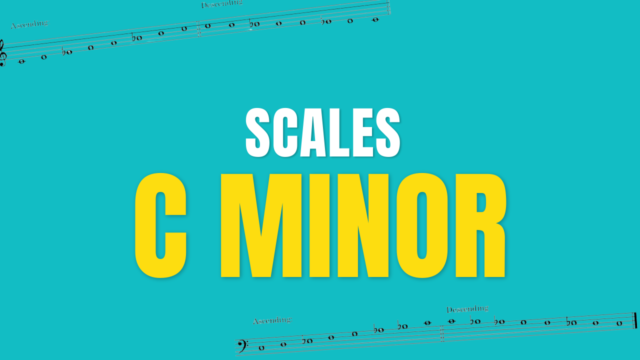C Minor scale is a scale that begins on C, and ends with C. The relative major key with the same key signature as C minor is E𝄬 Major.
C minor Key Signature
Here’s the key signature for C minor (B𝄬, E𝄬, A𝄬) in the 4 clefs.




Forming C minor scale
There are 3 types of minor scales:
Let’s look at all these 3 types of C minor in detail.
C Minor – Natural minor
In this natural minor scale, there are no additional accidentals. We follow the sharps/ flats of the key signature.
For a natural minor key, most adjacent notes are a tone apart except these pairs of notes:
- 2nd to 3rd
- 5th to 6th
C minor natural scale in treble clef:

C minor natural scale in bass clef:

C minor natural scale in alto clef:

C minor natural scale in tenor clef:

C Minor – Harmonic minor
In this harmonic minor scale, the seventh note is sharpened – for both ascending and descending. Hence, instead of playing B𝄬, we play B(𝄯) instead.
For a harmonic minor key, most adjacent notes are a tone apart except these pairs of notes:
- 2nd to 3rd
- 5th to 6th
- 7th to 8th
C minor (harmonic minor) in treble clef:

C minor (harmonic minor) in bass clef:

C minor (harmonic minor) in alto clef:

C minor (harmonic minor) in tenor clef:

C Minor – Melodic minor
For a melodic minor, we play slightly different notes for the ascending and descending scale.
For the ascending part of the melodic minor, we sharpen both the 6th and 7th note.
For the descending part of the melodic minor, it follows that of the natural minor (i.e. play sharps and flats for the notes only when the key signature says so).
For a melodic minor key, most adjacent notes are a tone apart. However, there are a few pairs of notes that are a semitone apart.
When ascending, these pairs of notes are a semitone apart:
- 2nd to 3rd
- 7th to 8th
When descending, these pairs of notes are a semitone apart:
- 6th to 5th
- 3rd to 2nd
C minor (melodic minor) in treble clef:

C minor (melodic minor) in bass clef:

C minor (melodic minor) in alto clef:

C minor (melodic minor) in tenor clef:

